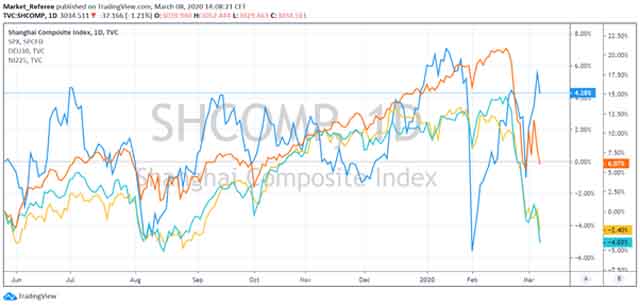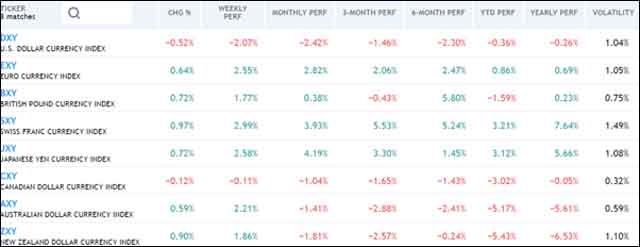Markets continue to present a certain level of instability and fear due to the spread of coronavirus all over the world. Investors are still uncertain of the economic impact it may produce, and even less sure on how to protect their fund when even countercyclical and defensive stocks fall.
Despite that coronavirus continues affecting markets and more than 2,700 people are under some form of quarantine in New York City, last week finished with S&P 500 gaining 0,61%, Nasdaq Composite increasing 0,10%, Industrial Dow Jones improving 1,79%, UX 100 Index down 1,79%, DAX registering a 2,93% downgrade, replicating Euro Stoxx 50 Index movement (-2,93%). Nikkei 225 rested 1,86%, while Hang Seng Index fined the week with 0,06% growth. Finally, the Russian Moex Index and Spanish Ibex 35 lowered 2,35% and 3,98% correspondingly.
Meanwhile, the yields government bonds have been pushed to record lows. It shows that demand for haven assets is increasing, as well as expectations that the US Federal Reserve will cut interest rates again. The week finished with the yield on a 10-year government bond at 0,767%.

Nevertheless, investors are still remaining invested in stocks in case positive news emerged about the virus vaccine. Unfortunately, these times are the most difficult for analysts, as the market dictates the direction and doesn’t matter whether you will be right about the future or not. But here is an interesting data: the best performing index so far is China’s Shanghai Composite. Take into account that cases of coronavirus in Europe only start to appear as well as in the USA.

It shouldn’t be a surprise to see the cost of insuring against the default of some of Europe’s biggest corporate borrowers rising over the past couple of days. On the other hand, according to the New York Times, “Business interruption insurance policies were more permissive in the past. But after other viral epidemics — such as SARS in 2003, Ebola in West Africa starting in 2014 and Zika, most recently in 2015 — insurance companies realized that business-interruption claims could become unwieldy if they covered shutdowns tied to outbreaks of disease.”
For now, some of the insurance companies are performing better than SPX. In addition, last week health insurers added about $48 billion in market value after Joe Biden’s once-faltering Democratic presidential campaign was reanimated on Super Tuesday. We find it important to mention that Sanders has campaigned on the promise of Medicare-for-all, which poses a threat to private insurers.

Talking about commodities fears that coronavirus will hurt global economic growth and demand for oil sent crude prices down. This decline was also caused by Russia disagreeing to cut oil production. In addition, Saudi Arabia slashed its official selling price (OSP) for April for all its crude grades to all destinations, after OPEC’s oil supply cut pact with Russia fell apart on Friday…
Finally, we would recommend to think strategically and try to find sectors, such as Media, Telecoms and Gaming that could benefit if people decide to stay home instead of going out. Also, consider that more companies allow their employees to work remotely. For example, US video conferencing company Zoom confirmed last week it’s seeing an increase in demand.
The previous week in the markets











